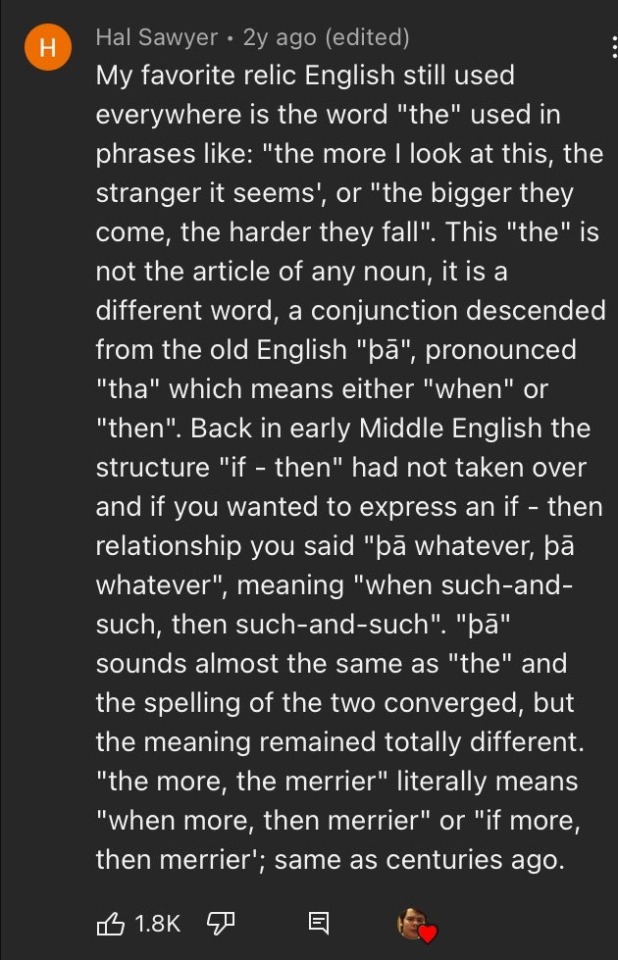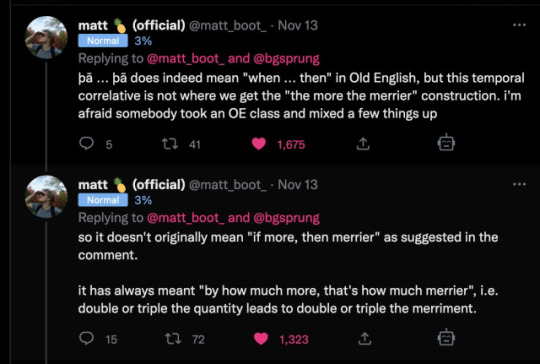#Language
Explore tagged Tumblr posts
Note
Why did you learn Finnish?
To communicate with my parents and extended family. At age 1 I started to feel a bit hungry and decided I should start speaking so that my parents would feed me.
Hope this helps!
46K notes
·
View notes
Text
Learning a new language really does make you aware of how many fucking words there are. Waaaaaay too many things in this world that need their own special little word. Grow up.
10K notes
·
View notes
Text

~ The Verbalist: A Manual Devoted to Brief Discussions of the Right and the Wrong Use of Words, by Alfred Ayres, 1919

[source]
53 notes
·
View notes
Text
This!!!
"You can't say french braid there's no France!!!!"
But I can say astronomy? What ancient greeks came up with that word derived from greek roots in the world where there was no Greece?
"That can be a translation though."
But then everything can! French braid, champagne and lesbian are just names for concepts, it's our language that calls them that.
You definitely can't say it's unreasonable to use those words. I kinda get the argument about this breaking immersion... But honestly, at this point every new universe has their own fantasy christianity for the 72516383830th time, and if that doesn't break your immersion, the word lesbian definitely shouldn't.
i always thought it was silly that people would get so pedantic & heated over the idea of fantasy novels using words derived from real locations like "champagne" or "lesbian" or whatever. "a fantasy setting cant have words that are dependent on real-world context" i have bad news for you about all words
13K notes
·
View notes
Text
If I had henchmen I would absolutely be commanding them to "seize him!", and when the target failed to respond with "unhand me!" because people don't actually talk that way, in spite of knowing this would be the outcome I would be bitterly disappointed every single time.
11K notes
·
View notes
Text
Speak English poorly. Speak with an exaggerated accent or with the pronunciations easier for your native language. Add your language to it. Speak with direct or poor translations of your words into English. Don't conform. Sound obnoxious, sound stereotypical. Be free. Fuck the americanization of the world. Prioritize your native language. Prioritize languages other than English. Listen to them. Listen to your own language.
23K notes
·
View notes
Text
No but this is one of those things that truly emphasizes the difference between how much we know about the world now versus how much we knew about it for the overwhelming majority of human history, because one upon a time, the cardinal directions relative to wherever you happened to be was really all most people had. There wasn't the world as we understand it now; there was the known world, because even when various peoples worked out that the planet was round, that still wasn't the same as knowing what all the contents were, or what might lie in the middle of a given ocean, or what was on the other side of that mountain range that was too dangerous to summit. Exonyms reflect the cardinal directions for the same reason why so many ancient old place names, once you dig through the layers of linguistic drift, are mostly just simple descriptors in whatever the oldest known language was: because the human experience was, for tens of thousands of years, intensely localised. Here was Hill, and there was River, and here was Desert, and there was Fort. The ancients weren't naming their local environment with the expectation that doing so would meaningfully differentiate, say, the local Mountain from that other Mountain two hundred miles away: they were naming it as a base function of communication, as a point of geographic reference to be understood by other members of the same community. It's only once human beings start moving around - not migrating, in the sense of leaving one place to find a new home, or trading, in the sense of forming relationships with the other people closest to you, but exploring, in the sense of deliberately trying to figure out what exists outside your immediate sphere and then reporting back on it - that this sort of linguistic differentiation starts to matter. "Those people to the east of us" works just fine as an exonym when you only know about your immediate neighbours or are content to lump everyone you imagine to exist in that direction under one umbrella, but once you've passed through that eastern territory and discovered that there's even more east with even more different people - once there's a need to distinguish between multiple groups - then you've got to broaden your terminology. Maybe you do that by borrowing someone else's exonym, because you ask "those people to the east of us" what they call their eastern neighbours, and so you take home a word that functionally also means "those people to the east" but in a slightly different language. Maybe you ask those people what they call themselves, and you get a word that translates to "the people," as so many ancient endonyms do. Or maybe you encounter those people with the aid of a third party, and you use their word, which means something like "the goat traders," because that's how the third group first encountered them. Or perhaps, as has happened more than once throughout history, you ask those new people "who are you?" or "what land is this?" in your own language, and mistake whatever confused reply they give in their language for the answer, even if what they actually said was "I don't understand you" or "welcome." But the point is, it's not a peculiarity of the human mind that makes us name things this way, as though we lack imagination. It's because the base purpose of naming has always been identification, and back when we first started attaching sounds to peoples and places, the frame of reference was local. Modern people, by contrast, in addition to understanding the exact size of our planet, are themselves the product of so many different linguistic and sociological shifts that, particularly in colonial settings, we view names primarily as aesthetic and titular, not as practical and descriptive, because we're sixteen layers removed from the point of origin: unless we look it up, they're just sounds to us now. And so we find the collective pattern of simple names funny, because we're seeing them in overview, and not as they were made.
etymology reveals a fascinating glimpse into the way the human mind works. "Australia" is just latin for southern. "Asia" is probably assyrian for east. "Norway" oh you mean those fuckers up north? for millennia humanity has been naming places the equivalent of: *gestures* yeah thataway
4K notes
·
View notes
Text

[ID: youtube comment from Hal Sawyer:
My favorite relic English still used everywhere is the word "the" used in phrases like: "the more I look at this, the stranger it seems, or "the bigger they come, the harder they fall". This "the" is not the article of any noun, it is a different word, a conjunction descended from the old English "þā", pronounced "tha" which means either "when" or "then". Back in early Middle English the structure "if - then" had not taken over and if you wanted to express an if - then relationship you said "þā whatever, þā whatever", meaning "when such-and- such, then such-and-such". "þā" sounds almost the same as "the" and the spelling of the two converged, but the meaning remained totally different. "the more, the merrier" literally means "when more, then merrier" or "if more, then merrier'; same as centuries ago.
end ID]
this is so cool
now with added wiktionary link
update, correction to this:


[image description: tweets from user Matt (official) that read, "this is not quite accurate. this 'the' comes from þȳ, the old instrumental case of the definite article. so it's like 'whereby x, therefore y' or 'by how much x, that's how much y.'
þā ... þā does indeed mean 'when ... then' in Old English, but this temporal correlative is not where we get 'the more the merrier' construction. i'm afraid someone took an OE class and mixed a few things up.
so it doesn't originally mean 'if more, then merrier' as suggested in the comment. it has always meant 'by how much more, that's how much merrier' i.e. double or triple the quantity leads to double or triple the merriment." end id.]
thanks to @wovesaxe for this addition
76K notes
·
View notes
Text
I love learning other Romance languages. I can read this sourced academic article from a nation I’ve never been in a language I’ve never formally studied and take away the key elements. Listening to this 101 for beginners conversation about breakfast is making my brain melt out of my ears
130 notes
·
View notes
Note
*jumps on logan from behind* BOO
- @yeskeeppettingmymustache
AH-! *Logan falls* ow... fuck that hurt.. was there something you needed Remus?
73 notes
·
View notes
Text
I'm not sure if this is used outside of Spain, but there's been an expression I've been seeing lately which is día sí y día también
Literally that's "day yes and day also"
But it means "day in and day out" or "day after day", like a more emphatic "daily"
The more usual one I see is día tras día "day after day", but día sí y día también feels like "each and every day"
55 notes
·
View notes
Text
Here's a Catalan expression I've heard many times...
Qui no té cap, té cames.
Those who don't have a head, have legs.
This is said to people with bad memory. If you forget things, you always have to run back and forth to get the things you forgot.
But I like another one, too:
Val més llapis curt que memòria llarga.
A short pencil is worth more than a long memory.
The safest way is to write everything down!
#llengua catalana#catalan#valencian#català#valencià#languages#language#langblr#romance languages#idioms#expressions
65 notes
·
View notes
Text
The only thing that didn't resonate was that ratshit is somehow higher quality than dogshit.

76K notes
·
View notes
Text
If you ever find yourself wondering why half of the internet posts and comments written by French native speakers contain more spelling mistakes than words, listen and see why in 20 seconds.
59 notes
·
View notes
